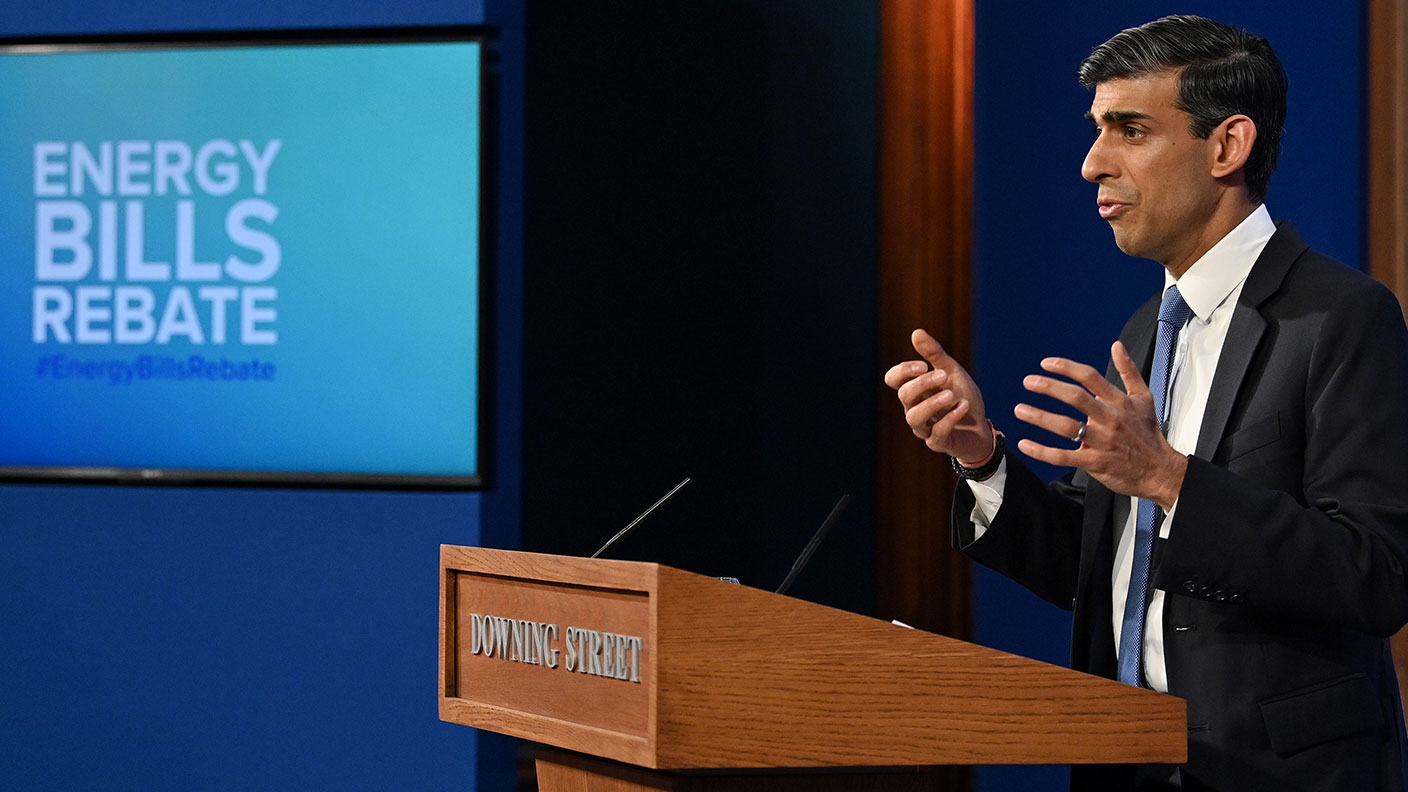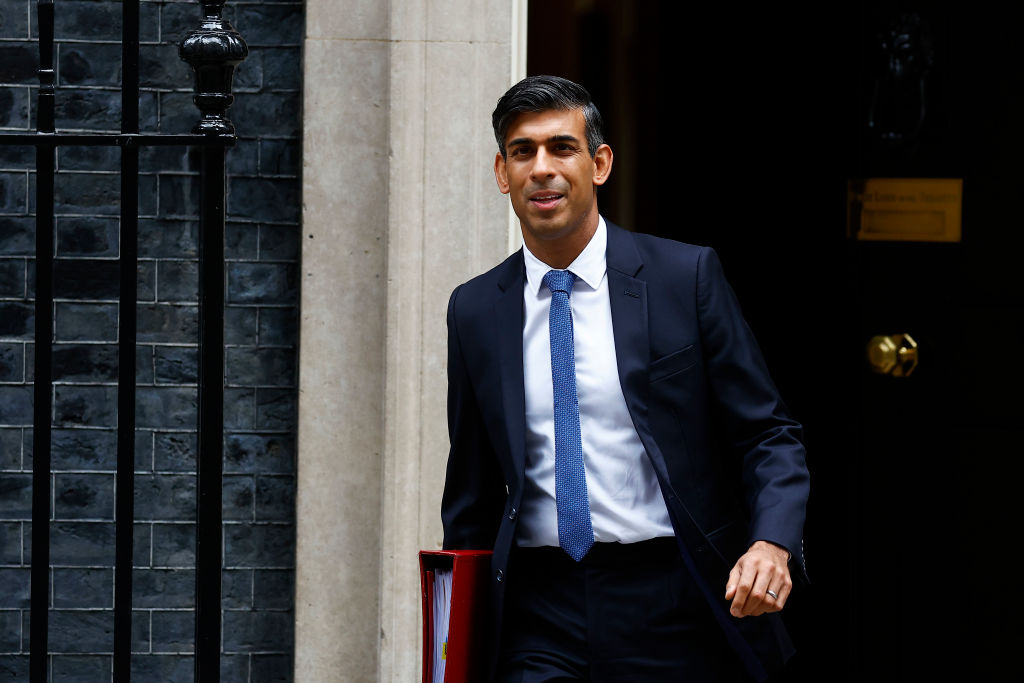Energy bills rebate: what is the government’s plan?
The government recently said that it would rebate some of the cost of rising energy prices to consumers. Saloni Sardana looks at what's planned.


Get the latest financial news, insights and expert analysis from our award-winning MoneyWeek team, to help you understand what really matters when it comes to your finances.
You are now subscribed
Your newsletter sign-up was successful
Want to add more newsletters?

Twice daily
MoneyWeek
Get the latest financial news, insights and expert analysis from our award-winning MoneyWeek team, to help you understand what really matters when it comes to your finances.

Four times a week
Look After My Bills
Sign up to our free money-saving newsletter, filled with the latest news and expert advice to help you find the best tips and deals for managing your bills. Start saving today!
As the UK grapples with a severe energy crisis, it is becoming increasingly rare for consumers to hear any positive news on this front.
Yet, some positive news did come from UK’s chancellor Rishi Sunak earlier this month when he said the government plans to rebate some of the cost of rising energy prices to consumers.
The vast majority of households expected to receive up to £350 of help due to a combination of a council tax discount and a (repayable) energy bill discount.
MoneyWeek
Subscribe to MoneyWeek today and get your first six magazine issues absolutely FREE

Sign up to Money Morning
Don't miss the latest investment and personal finances news, market analysis, plus money-saving tips with our free twice-daily newsletter
Don't miss the latest investment and personal finances news, market analysis, plus money-saving tips with our free twice-daily newsletter
Why is the government doing this?
Current proposals to provide energy rebates – financial support against rising bills – comes after the energy price cap – the maximum price per kilowatt hour (kWH) that energy providers can charge consumers for gas and electricity – is to rise by almost £700 from April.
Energy prices have hit the roof both in the UK and globally, for many reasons. Rising gas prices, lower wind output in the UK, under-investment in renewables, higher demand for liquified natural gas and reduced supply from Russia are some of the main reasons playing a part.
How will the energy bill discount scheme work?
The energy bills rebate will mean 28 million households in Wales, England and Scotland will receive a £200 credit on their bills this autumn. It is not a gift, however – it is a loan that will be automatically recovered from people’s bills in equal £40 instalments over the following five years, when wholesale prices are expected to drop.
The government considers this a more manageable way for people to pay high energy bills and a way to give consumers some respite.
More details on the scheme are expected in spring after the Department for Business, Energy and Industrial Strategy consult on the matter.
How will the Council Tax rebates work?
Under government plans, householders in England liable to pay council tax in bands A-D – currently 80% of the population – will receive a payment of £150 direct from their local council. Those who pay no council tax or pay less than £150 in bands A-D, are also eligible for this amount. In contrast to the £200 energy bill “rebate”, the council tax discount will not need to be repaid.
Local authorities will also receive £144 million of discretionary funding to help for those who are struggling to pay their energy bills but are not eligible – such as households on income support in higher bands (E-H) or with properties in bands A-D that are exempt from council tax
The money is expected to reach consumers in April.
Will all consumers in the UK benefit equally from the measures?
The £200 energy bill discount measures apply to consumers in England, Wales and Scotland. Northern Ireland – where energy policy is devolved – is expected to receive £150m of comparable funding next year.
Meanwhile, the Council Tax Energy Rebate applies in England only, as council tax policy differs across Wales, Northern Ireland and Scotland. The devolved nations will therefore receive funding worth £565m (£290m for Scotland, £175m for Wales, and £100m for the Northern Ireland Executive), which will allow them to provide similar relief measures.
What other forms of help are available for those struggling with energy bills?
The government has already been exploring other measures to alleviate the cost of living crisis and so far provided around £12bn of support including measures including freezing alcohol and fuel duty and raising the national living wage.
The government has expanded its eligibility for the Warm Home Discount by almost a third and increased the rebate value to £150, so that three million vulnerable households will benefit.
The Warm Home Discount is currently worth £140 for households on low incomes. While many suppliers have already closed their schemes for 2021-2022, some providers, including SO Energy, E.ON Next and Bulb, are still accepting applications, says MoneySavingExpert’s Martin Lewis.
Another source of help for those combatting energy inflation is the Winter Fuel Payment, which is paid out each year by the Department for Work and Pensions to those aged over 65 to help them afford additional heating costs. People aged under 80 typically receive £200 a year, meanwhile those older than 80 receive £300 a year.
Get the latest financial news, insights and expert analysis from our award-winning MoneyWeek team, to help you understand what really matters when it comes to your finances.
Saloni is a web writer for MoneyWeek focusing on personal finance and global financial markets. Her work has appeared in FTAdviser (part of the Financial Times), Business Insider and City A.M, among other publications. She holds a masters in international journalism from City, University of London.
Follow her on Twitter at @sardana_saloni
-
 How a ‘great view’ from your home can boost its value by 35%
How a ‘great view’ from your home can boost its value by 35%A house that comes with a picturesque backdrop could add tens of thousands of pounds to its asking price – but how does each region compare?
-
 What is a care fees annuity and how much does it cost?
What is a care fees annuity and how much does it cost?How we will be cared for in our later years – and how much we are willing to pay for it – are conversations best had as early as possible. One option to cover the cost is a care fees annuity. We look at the pros and cons.
-
 Rishi Sunak: MoneyWeek Talks
Rishi Sunak: MoneyWeek TalksPodcast On the MoneyWeek Talks podcast, Rishi Sunak tells Kalpana Fitzpatrick that we need better numeracy skills to improve financial literacy and boost the economy.
-
 Winter Fuel Payment cut to hit ‘1.5 million’ pensioners - what support does your energy supplier offer?
Winter Fuel Payment cut to hit ‘1.5 million’ pensioners - what support does your energy supplier offer?Advice The Winter Fuel Payment is being scrapped for most pensioners this year. But you may be able to access extra support from your energy supplier. Here’s what’s on offer.
-
 Is an inheritance tax (IHT) cut on the way?
Is an inheritance tax (IHT) cut on the way?Tax Talk that the government might cut or scrap inheritance tax in its Autumn Statement is rife. We look at how it could be reformed, and what difference it would make.
-
 Act now to bag NatWest-owned Ulster Bank's 5.2% easy access savings account
Act now to bag NatWest-owned Ulster Bank's 5.2% easy access savings accountUlster Bank is offering savers the chance to earn 5.2% on their cash savings, but you need to act fast as easy access rates are falling. We have all the details
-
 Moneybox raises market-leading cash ISA to 5%
Moneybox raises market-leading cash ISA to 5%Savings and investing app MoneyBox has boosted the rate on its cash ISA again, hiking it from 4.75% to 5% making it one of top rates. We have all the details.
-
 October NS&I Premium Bonds winners - check now to see what you won
October NS&I Premium Bonds winners - check now to see what you wonNS&I Premium Bonds holders can check now to see if they have won a prize this month. We explain how to check your premium bonds
-
 Government considering cuts to inheritance tax, reports say
Government considering cuts to inheritance tax, reports sayThe Sunday Times reported government officials are considering cuts to inheritance tax ahead of the general election.
-
 The best packaged bank accounts
The best packaged bank accountsAdvice Packaged bank accounts can offer great value with useful additional perks – but get it wrong and you could be out of pocket
